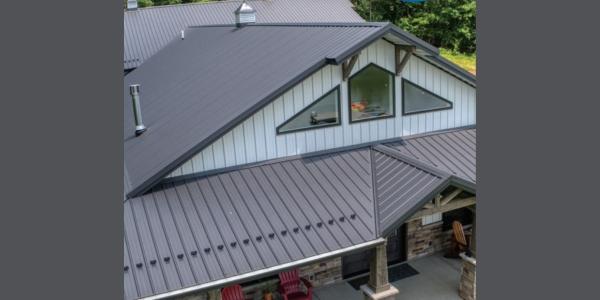UP TO THE MINUTE
Silicone Coatings That Won’t Crack Under Pressure
By Polyglass.
Silicone roof coatings stand out for their durability, cost-effectiveness and waterproofing qualities.
As a commercial roof ages and wears down, building owners face the daunting decision of a complete roof replacement — a costly and time-consuming affair. However, silicone roof coatings can present an attractive alternative, offering a practical solution to these common roofing problems without needing to resort to a full reroof.
Understanding the attributes and potential applications of these coatings can be instrumental in the decision-making process. That’s why in this article, we’ll explain the differences between silicone and other roof coating alternatives as well as explore some of the pros and cons, after which you should be well equipped in helping a building owner make the best choice for their building.
Why would someone need roof coating?
Because a building’s roof is always exposed to the elements, it can take a lot of punishment over the years. This can result from extreme weather conditions, the expansion and contraction of the roof under fluctuating temperatures or prolonged exposure to things like standing water or ultraviolet rays.
Instead of completely replacing a still largely functional roof, a more cost-effective option would be to apply some form of roof coating. These products are applied to the roof’s surface in one or two coats and help plug any cracks or damage. They are relatively cheap and easy to apply.
Roof coatings can buy a roof several extra years of protection. One of the more common types of roof coating is silicone, but it can be confusing to distinguish between all the different roof coating types.
Roof coating types
Roof coatings are broadly divided into two main categories: asphaltic coatings and elastomeric coatings.
- Asphaltic coatings are usually made of asphalt, bitumen or tar. They need to be used on roofs made from the same material because asphaltic coatings cannot adapt well to fluctuations in temperature.
- Elastomeric coatings are commonly made using acrylic or silicone. Elastomeric roof coatings can expand and contract with the roof as it responds to fluctuating temperatures. This makes elastomeric coatings more compatible with a larger array of roofing types.
We’ll focus on silicone roof coatings in this post, so it makes sense to compare silicone coatings to their elastomeric counterparts: acrylic coatings.
Acrylic coatings are cheap, but they are also brittle and vulnerable to weathering. This means that they don’t last as long as silicone coatings. Acrylic roof coatings have good reflective properties to protect against UV rays but don’t stand up well against water.
Silicone coatings act as sealants to prevent air and water from penetrating cracks in the roof, thanks to their strong water resistance. Silicone coatings are also more durable and will not become brittle.
Polyglass offers a range of high-quality silicone roof coatings for a wide range of applications and we’ll cover these more later on.
Pros of silicone coatings
Cost-effective
Silicone roof coatings are a much more cost-effective option than replacing an entire roof, working out around $6 cheaper per square foot of roof. Silicone coatings provide a good balance of durability, quality and waterproofing over other types of roof coating.
Durability
Due to their chemistry, silicone roof coatings can stand up to harsher conditions than other types. Because it expands and contracts naturally with the roof, silicone will not become brittle. This flexibility, along with its inorganic composition, helps it last for years.
Environmentally friendly
Silicone roof coatings are one of the most environmentally friendly coating options. They contain fewer solvents than most other moisture curing products, the high solids version being solvent-free.
Lifespan
Using a roof coating can add over a decade to the longevity of a roof. Depending on thickness, silicone coatings can offer up to 20 years of additional protection.
Quick application
Silicone roof coatings are quick and easy to apply. Installing a silicone roof coating doesn’t require any heat-based methods, which can pose safety risks. Having a higher solids content than other coatings, silicone roof coatings require thinner layers to create an effective seal.
Versatile
Silicone roof coatings are compatible with a wide variety of roofing materials and can be applied to concrete, metal, modified bitumen and single-ply roofing systems. A primer is sometimes required.
Water and UV protection
Silicone roof coatings fare the best against standing water and rain. The silicone acts as a seal to stop water from breaking through. Silicone coatings can also reflect up to 90% of UV rays from the sun, keeping the building cool and reducing energy costs.
Cons of silicone coatings
Adhesion
Silicone can be difficult to re-coat unless you’re using more silicone. This can cause problems when a roof needs to be completely replaced as the existing silicone coating must be completely removed.
Gets dirty
Silicone roof coatings can trap dirt on the surface, leading to a grimy-looking roof. The softness of the coating is the cause of this issue.
Loss of reflectivity
Although silicone roof coatings boast good reflectivity when new, this can lessen over time as the coating is exposed to the elements and gets dirty.
Slippery
A silicone-coated roof can become incredibly slippery in wet conditions, which can be a safety hazard to anyone working on the roof. This is exponentially true on steep-sloped roofs.
Vulnerable to tearing
While silicone coatings are pretty durable, they aren’t able to stand up to tearing. Areas that are prone to tearing may be remedied by incorporating fabric reinforcement with the coating.
How are silicone coatings installed?
Silicone roof coatings are fairly straightforward to install. The roof must be cleaned first to provide a clear surface for adhesion. The silicone coating is then applied using spray equipment, a brush, squeegee and/or roller at the desired thickness for the individual roof surface.
Polyglass silicone coatings
As an industry-leading company, Polyglass offers a wide range of silicone roof coatings suitable for any project. Let’s highlight two of our coating products:
Polybrite 90
This premium, high-solid silicone coating is a true workhorse and can be applied over several types of roofs. Polybrite 90 helps prolong the life of a roof by increasing UV protection and strengthening the roof against the elements. It is available in white and tinted variations.
Polybrite 95
The Polybrite 95 silicone coating is a solvent-based formula that can increase the lifespan of several roofing types. Polybrite 95 enhances a roof with seamless membranes for exceptional water protection and increased energy efficiency.
Original article source: Polyglass
Learn more about Polyglass in their Coffee Shop Directory or visit www.polyglass.us.



















Comments
Leave a Reply
Have an account? Login to leave a comment!
Sign In